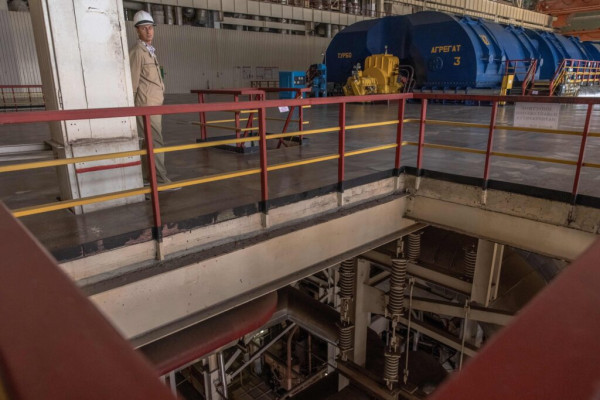Ukraine doubles down on Russian reactors in nuclear power push
Ukraine will push forward with controversial plans to spend hundreds of millions of dollars on aging Russian-made nuclear reactors despite growing opposition from lawmakers, the country's energy minister said, amid warnings of a major power crisis this winter.
German Galushchenko told POLITICO that the government still intends to pursue the expansion of the Khmelnytskyi nuclear power station in western Ukraine, buying two VVER-1000 reactors currently in storage in Bulgaria. The proposal has drawn criticism from the ruling party's own MPs, who say there are quicker ways to help prop up the electricity grid, which has been hit hard by Russian bombing.
"Our energy system is withstanding this pressure first of all thanks to nuclear power," Galushchenko said. "Taking that into account, we need more generation, even in the recovery and especially after the war. We understand that any kind of nuclear project takes years, so we need to start as quickly as we can, especially in this situation where we have the building constructed and ready."
Last week, Ukrainian MPs told POLITICO that the government had been forced to acknowledge it did not have sufficient support in the parliament to pass a draft law legislating for the purchase of the reactors.
According to Andrii Zhupanyn, a lawmaker from President Volodymyr Zelenskyy's Servant of the People Party, such defeats are "extremely rare."
MPs questioned whether the mothballed reactors, bought by Bulgaria more than a decade ago, would be able to be quickly brought into service, and whether the funds could be better spent on renewable power and other sources of electricity. The costs, they said, would likely balloon and open the door to corruption.

However, Galushchenko vowed to win over skeptics and get the project off the ground.
"We are continuing work with the parliament to adopt this law because it is a very important project for us," he said. "I am confident that the parliament will adopt the law."
There is no suggestion that Russia will earn revenue from the sale of the two reactors, which Bulgaria put aside after plans to deploy them fell through. Sofia has since signed off on a plan to expand its Kozloduy nuclear power station with U.S. atomic energy giant Westinghouse.
Ukraine's critical energy infrastructure, including geothermal power plants and grid transformers, has come under sustained attack by Russian missiles and drones in recent months, requiring significant imports of electricity from the EU to meet the new shortfall.
“We are trying, of course, to repair every facility which is possible to repair, to add additional generation to the system,” said Galushchenko. But he warned that Ukraine is now “really on the eve of probably the hardest winter in the history of the country.”